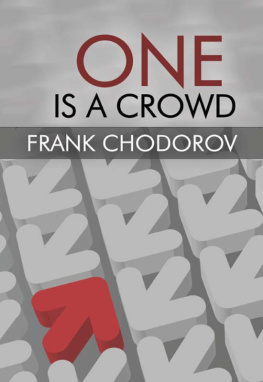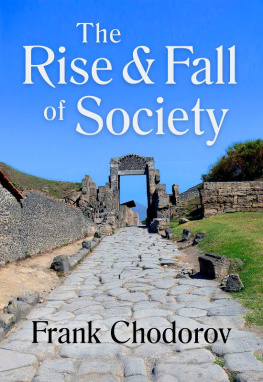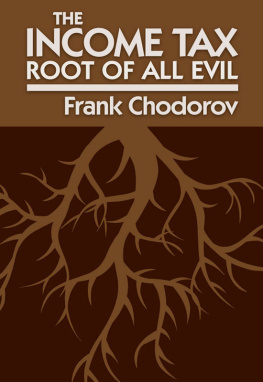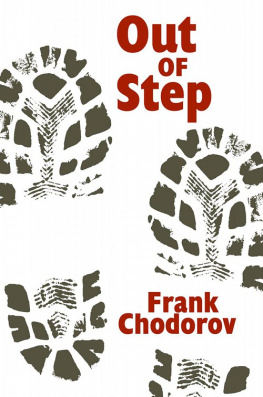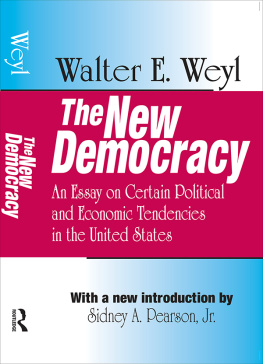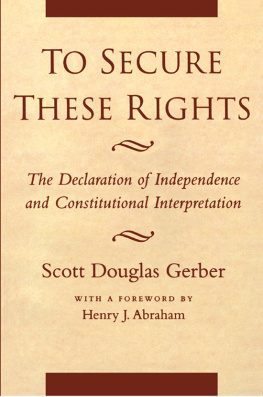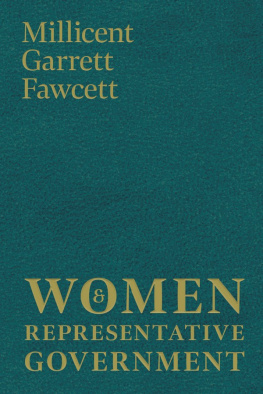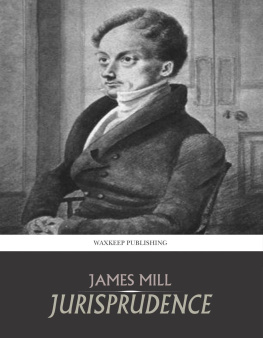ONE
IS
A
CROWD
ONE
IS
A
CROWD
REFLECTIONS
OF AN
INDIVIDUALIST
FRANK CHODOROV
With an introduction by JOHN CHAMBERLAIN
THE DEVIN-ADAIR COMPANY, NEW YORK, 1952

Copyright 1952
by Frank Chodorov.
Material in this book
must not be reprinted in any form
without written permission from the publisher.
For information, write:
The Devin-Adair Company,
23 East 26th Street,
New York 10, N. Y.
ACKNOWLEDGMENT
Some of the essays
in this book have previously
appeared in Analysis;
others in Human Events,
Faith and Freedom,
and The Human Affairs Pamphlets,
the last copyright by
Henry Regnery Company.
Still others appear for
the first time.
Book designed by Lewis F. White
Printed in the United States of America
DEDICATION
To Lisa and Eric
and their generation
INTRODUCTION
Along about 1935, in response to the so-called challenge of communism, America was blanketed by a literature of crypto-collectivism. There were neo-technocrats and planners by the score; the Keynesians and middle way journalists were out like night crawlers after a vesper shower. If numbers and the sort of thing that passes for intellectual journalism in this country were ever definitive, the cultural climate of our nation would have been altered beyond recall in those years. But one of the grand lessons of history is that you can not break the continuity of a culture or a tradition unless you are prepared to liquidate all those who have known the douceur de la vie of the old regime.
Lenin said it long ago: to make collectivism stick in a land that has known the blessings of individualism, you must catch a whole generation in the cradle and forcibly deprive it of tutors who have learned the bourgeois alphabet at their mothers knees. In a land of republican law this is impossible; no matter how clever or omnipresent the collectivist propaganda may be, a few culture-carriers of the old tradition will escape. They may be reduced to publishing broadsheets instead of books; they may be compelled to conduct their straggling classes in dingy rooms in old brownstone fronts. Certainly they will have a hard time getting posts on a university faculty. But they will be still hanging aroundand still talkingwhen the tinsel begins to wear off the latest Five-Year Plan or government-sponsored Greenbelt colonization scheme. Their books and pamphlets, ready for the chance encounter that sparks all revolutions or reactions, will fan the revival of the old tradition that periodically displaces the callow presumptions of the new.
A recent preoccupation with my own intellectual autobiography has led me to reflect on the culture-carriers who brought me back to what I had originally soaked up unconsciously in the individualistic New England of my childhood. One of these carriers was Albert Jay Nock, whose Our Enemy the State hit me between the eyes when I read it in the thirties. Another potent carrier was Franz Oppenheimer, whose concept of the State-as-racket (see his epochal book on The State) was too formidably grounded in history to permit of any easy denial. Still another carrier was Garet Garrett, the only economist I know who can make a single image or metaphor do the work of a whole page of statistics. Then there was Henry George, the Single Taxer, and the Thoreau whose doctrine of civil disobedience implied a fealty to a higheror a Naturallaw, and Isabel Paterson, the doughty and perennially embattled woman who wrote The God of the Machine. Finally, there was a man who sometimes spoke in parables and who always had a special brand of quiet humor, Mr. Frank Chodorov, whose lifetime of broadsheet writing and pamphleteering has been brilliantly raided by Devin A. Garrity of the Devin-Adair Co. to make this book.
Frank Chodorov is 65 years old, which means that he has been around. But he has the intellectual resilience that one would associate with the age brackets of the twenties and the thirties if the young of 1952 did not seem so frightened, so recessive, so pinched and so antique. The formal biography of Mr. Chodorov says that he once lectured at the Henry George School of Social Science; that he revived and edited The Freeman with Albert Jay Nock from 1938 to 1941 (The Freeman is one of those magazines that is always coming up out of its own ashes, like the phoenix); that after one of the intermittent deaths of The Freeman he published, wrote and edited his own four-page monthly broadsheet called analysis; that he is currently engaged in editing Human Events with Frank Hanighen in Washington, D. C.
A craftsman from the ground up, Frank Chodorov has always made his own words pirouette with the grace and fluidity of a Pavlova. Beyond this he is one of the few editors alive who can make individual stylists of others merely by suggesting a shift in emphasis here, an excision there, a bit of structural alteration in the middle. To talk over the luncheon table with Frank Chodorov about the problems of writing and editing is a liberal journalistic education. But this is only the least important part of the education that one can absorb from him when he is expanding in his own ruefully humorous way.
Listening to Mr. Chodorov, you wont get any meaningless gabble about right and left, or progressive and reactionary, or liberalism as a philosophy of the middle of the road. Mr. Chodorov deals in far more fundamental distinctions. There is, for example, the Chodorovian distinction between social power and political power. Social power develops from the creation of wealth by individuals working alone or in voluntary concert. Political power, on the other hand, grows by the forcible appropriation of the individuals social power. Mr. Chodorov sees history as an eternal struggle between social-power and political-power philosophies, When social power is in the ascendant, men are inclined to be inventive, creative, resourceful, curious, tolerant, loving and good-humored. The standard of well-being rises in such timesvide the histories of republican Rome, of the Hanseatic cities, of the Italian renaissance, of nineteenth century Britain and of modern America. But when political power is waxing, men begin to burn books, to suppress thought, and to imprison and kill their dissident brothers. Taxation, which is the important barometer of the political power, robs the individual of the fruits of his energy, and the standard of life declines as men secretly rebel against extending themselves in labor that brings them diminishing returns.
According to the Chodorov rationale, all the great political movements of modern times are slave philosophies. For, no matter whether they speak in the name of communism, socialism, fascism, New Dealism or the Welfare (sometimes called the Positive) State, the modern political philosophers are all alike in advocating the forcible seizure of bigger and bigger proportions of the individuals energy. It matters not a whit whether the coercion is done by club or the tax agentthe coercion of labor is there; and such coercion is a definition of slavery. Nor does it matter that the energy-product of one individual is spent by the government on another: such spending makes beneficiaries into wards, and wards are slaves, too.
Mr. Chodorov is a mystic, but only in the sense that all men of insight are mystics. His mystical assumption is that men are born as individuals possessing inalienable rights. This philosophy of Natural Rights under the Natural Law of the Universe can not be proved. But neither can the opposite philosophythat Society has rightsbe proved, either. You can say it is demonstrable that a State, as the police agent of Society, has power. But if there is no such thing as natural individual rights, with a correlative superstructure of justice organized to maintain those rights, then the individual has no valid subjective reason for obeying State power. True, the State can arrest the individual and compel his temporary obedience. But it can not compel his inner loyalty; nor can it keep men from cheating, or from the quiet withdrawal of energy. The rebellious individual can always find ways of flouting State powerwhich makes it dubious that Society (or the collectivity of men organized to compel individual men; has rights in any meaningful sense of the word. A collectivity can not have anything which its constitutive elements refuse to give up.

